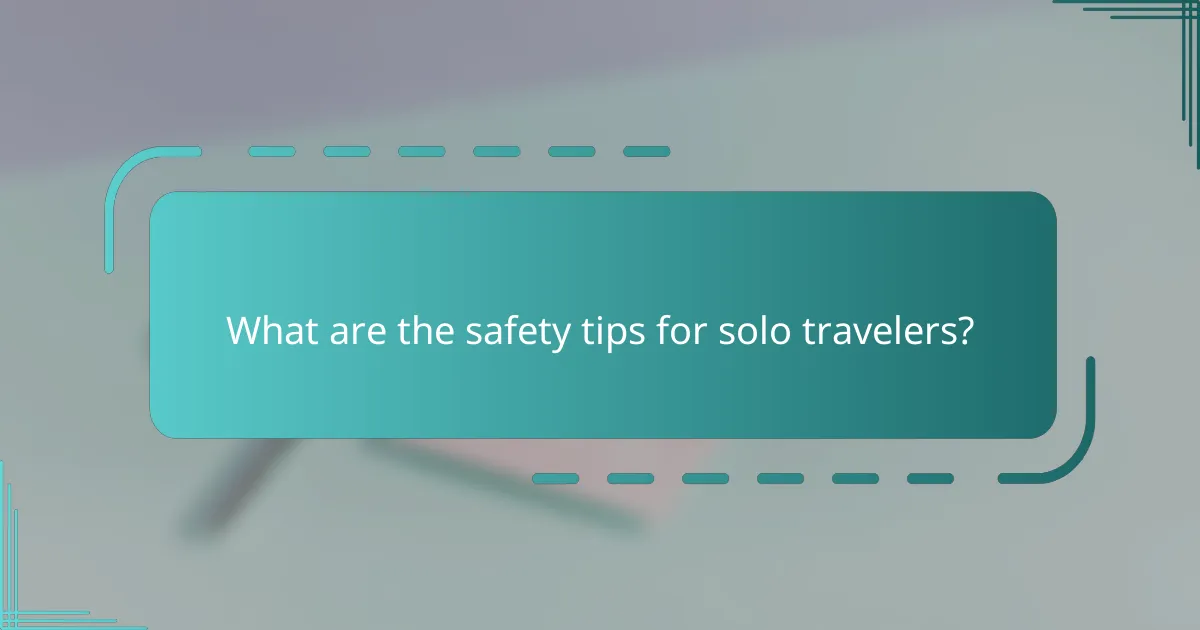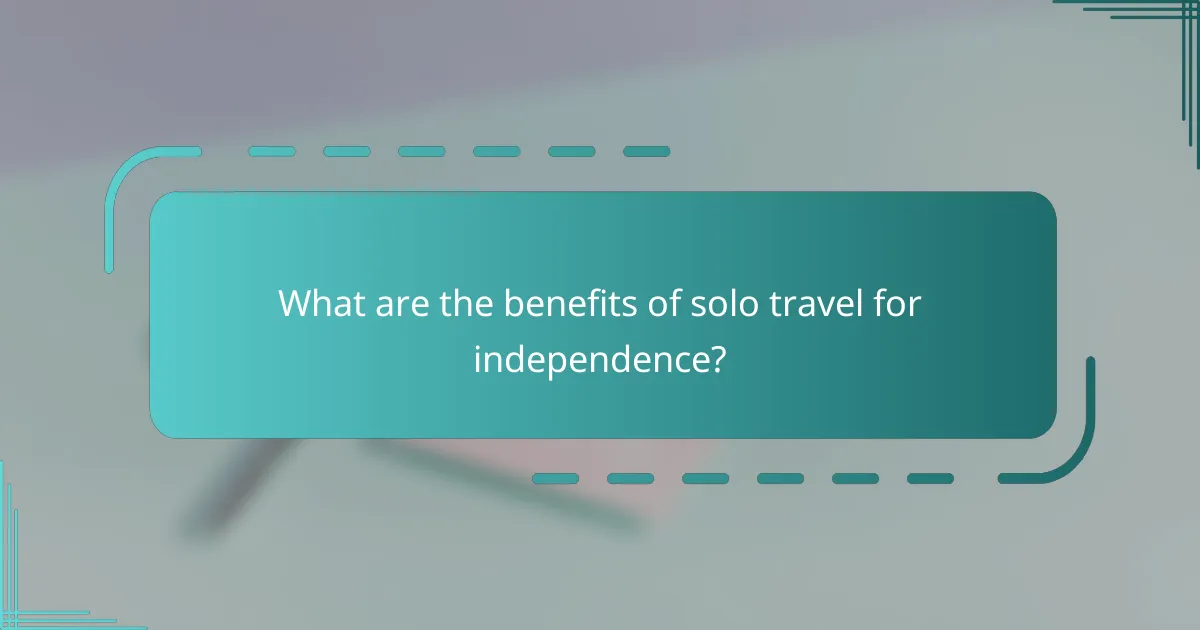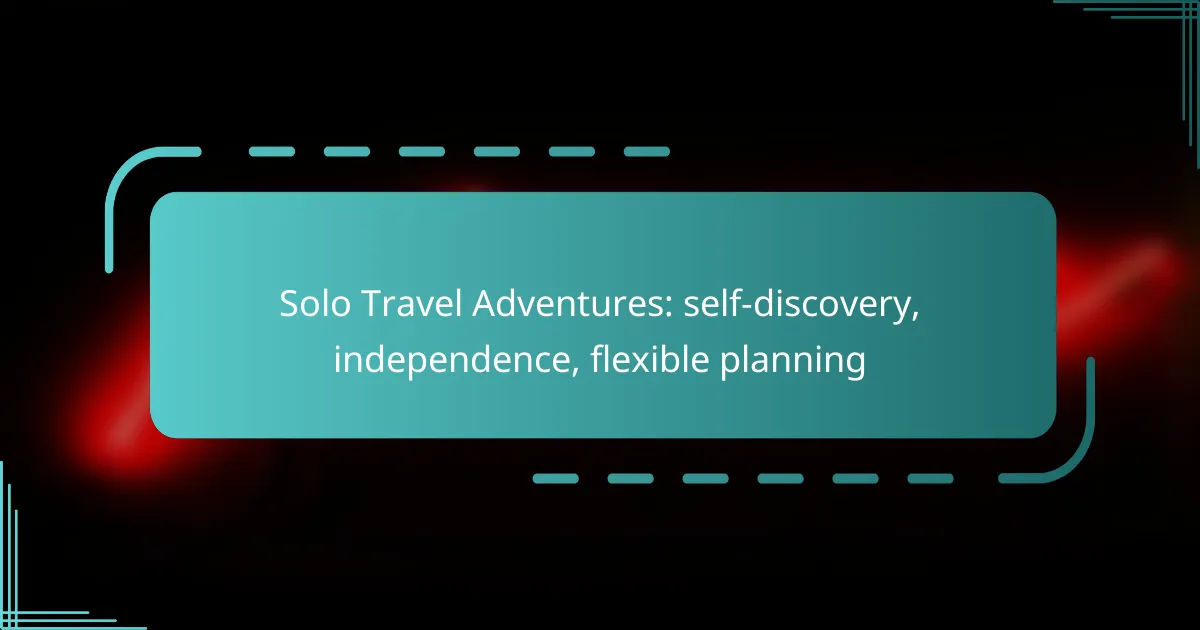Embarking on a solo travel adventure is a transformative experience that fosters self-discovery and independence. By navigating new environments alone, travelers gain valuable insights into their identity and desires, all while enjoying the freedom to explore at their own pace. With flexible planning, individuals can adapt their itineraries to embrace spontaneous opportunities, making each journey uniquely enriching.

How can solo travel enhance self-discovery?
Solo travel significantly enhances self-discovery by providing opportunities for personal reflection and exploration. When traveling alone, individuals often confront their thoughts and feelings, leading to greater insights about their identity and desires.
Personal growth through new experiences
Traveling alone exposes you to diverse cultures, cuisines, and lifestyles, fostering personal growth. Each new experience, from navigating a foreign city to trying an unfamiliar dish, challenges your comfort zone and encourages adaptability.
Consider setting a goal to engage in at least one new activity each day, such as attending a local workshop or exploring a hidden gem. This approach not only enriches your journey but also builds a sense of accomplishment.
Increased self-awareness and confidence
Solo travel promotes self-awareness by allowing you to reflect on your preferences and values without external influences. As you make decisions independently, you gain confidence in your judgment and abilities.
Keep a travel journal to document your thoughts and feelings throughout your journey. This practice can help clarify your goals and reinforce your sense of self, making you more attuned to your needs and aspirations.
Building resilience in unfamiliar environments
Facing the challenges of solo travel, such as language barriers or unexpected situations, builds resilience. Each obstacle you overcome enhances your problem-solving skills and adaptability, preparing you for future challenges.
To strengthen your resilience, embrace a mindset of curiosity rather than fear. Approach setbacks as learning opportunities, and remember that flexibility is key to navigating the unpredictability of travel.

What are the best destinations for solo travel?
The best destinations for solo travel offer a mix of safety, cultural experiences, and opportunities for self-discovery. Popular choices include Japan, New Zealand, and Portugal, each providing unique advantages for independent travelers.
Japan for cultural immersion
Japan is an ideal destination for solo travelers seeking deep cultural immersion. With its rich history, vibrant cities, and serene countryside, you can explore ancient temples, participate in traditional tea ceremonies, and enjoy local cuisine. Cities like Kyoto and Tokyo offer a blend of modernity and tradition, making them perfect for solo exploration.
When traveling alone in Japan, consider using the extensive public transportation system, which is known for its punctuality and efficiency. Purchasing a Japan Rail Pass can be a cost-effective way to travel between cities. Always be respectful of local customs, such as bowing when greeting and removing shoes when entering homes or certain establishments.
New Zealand for adventure and nature
New Zealand is renowned for its breathtaking landscapes and adventure activities, making it a top choice for solo travelers. From hiking the stunning trails of Fiordland National Park to bungee jumping in Queenstown, there are countless opportunities for adrenaline seekers. The friendly locals and laid-back atmosphere add to the appeal of exploring this beautiful country alone.
For a seamless experience, consider joining guided tours or adventure groups, which can provide safety and camaraderie. Renting a campervan is another popular option, allowing you to explore at your own pace while enjoying the stunning scenery. Remember to check local regulations regarding camping and driving to ensure a smooth journey.
Portugal for affordability and safety
Portugal stands out as an affordable and safe destination for solo travelers. With its stunning coastline, historic cities like Lisbon and Porto, and delicious cuisine, it offers a rich travel experience without breaking the bank. Public transportation is reliable and inexpensive, making it easy to navigate between cities and attractions.
To maximize your experience, consider staying in hostels or budget accommodations that cater to solo travelers. Engaging with locals through food tours or cultural experiences can enhance your trip and provide valuable insights. Always keep an eye on your belongings, especially in crowded areas, to ensure a worry-free adventure.

How to plan a flexible solo travel itinerary?
To plan a flexible solo travel itinerary, prioritize adaptability in your travel arrangements. This approach allows you to make real-time changes based on your experiences and preferences, enhancing your journey of self-discovery and independence.
Using travel apps for real-time adjustments
Travel apps are essential for making real-time adjustments to your itinerary. Apps like Google Maps, TripIt, or Kayak can help you find nearby attractions, restaurants, or accommodations, allowing you to modify your plans on the go.
When using these apps, enable notifications for updates on flight changes or local events. This ensures you stay informed and can adjust your plans accordingly, maximizing your travel experience.
Incorporating open-ended travel dates
Open-ended travel dates provide the freedom to explore without the pressure of a strict schedule. Consider booking flights with flexible return options or choosing destinations that allow for spontaneous extensions.
For instance, if you plan to visit Europe, consider a round-trip ticket with a flexible return date, allowing you to extend your stay if you discover a place you love. This flexibility can lead to unexpected adventures and deeper connections with your surroundings.
Choosing accommodations with flexible cancellation policies
Selecting accommodations with flexible cancellation policies is crucial for a flexible itinerary. Look for hotels or hostels that offer free cancellation or allow changes up to a certain date without penalties.
Platforms like Booking.com or Airbnb often provide filters for flexible options. This way, if your plans change, you can adjust your stay without financial stress, ensuring you have the freedom to explore at your own pace.

What are the safety tips for solo travelers?
Solo travelers should prioritize safety by staying aware of their surroundings, keeping in touch with local contacts, and researching safe areas. Implementing these strategies can significantly reduce risks and enhance the travel experience.
Staying connected with local contacts
Establishing connections with locals can provide valuable insights into the area and enhance your safety. Consider reaching out to friends or acquaintances who live in the destination or using platforms like social media to find local groups.
Always share your itinerary with someone you trust, whether it’s a friend back home or a local contact. Regular check-ins can ensure someone is aware of your whereabouts, which is crucial in case of emergencies.
Researching safe neighborhoods
Before traveling, research neighborhoods to identify which areas are safe for solo travelers. Look for online resources, travel forums, and local news to gauge the safety of different districts.
When you arrive, stick to well-lit and populated areas, especially at night. Avoid neighborhoods known for high crime rates, and consider using apps that provide real-time safety information about your surroundings.
Trusting your instincts and being aware
Trusting your instincts is vital for solo travelers. If a situation feels uncomfortable or unsafe, don’t hesitate to leave or seek help. Your intuition can often guide you better than any map or guidebook.
Stay aware of your surroundings by limiting distractions, such as excessive phone use. Regularly assess your environment and be mindful of people around you, particularly in crowded places or public transportation.

How to budget for solo travel?
Budgeting for solo travel involves estimating your total expenses, including accommodation, food, transportation, and activities. Start by determining your destination and the duration of your trip, then allocate funds accordingly to ensure a financially stress-free experience.
Using travel rewards credit cards
Travel rewards credit cards can significantly reduce your travel costs by offering points or miles for every dollar spent. Choose a card that aligns with your travel habits, such as those that provide bonus points for travel-related purchases or no foreign transaction fees.
When using these cards, pay attention to the annual fees and interest rates. Aim to pay off your balance each month to avoid interest charges, which can negate the benefits of the rewards. Look for sign-up bonuses that can cover a portion of your travel expenses.
Finding affordable solo travel packages
Affordable solo travel packages often include flights, accommodations, and sometimes meals or activities, making them a convenient option for budget-conscious travelers. Research various travel agencies or websites that specialize in solo travel to find deals tailored to your needs.
Consider traveling during the off-peak season to take advantage of lower prices. Additionally, flexible travel dates can help you find better deals, as prices can vary significantly based on demand. Always compare multiple packages to ensure you’re getting the best value.
Tracking expenses with budgeting apps
Budgeting apps can help you monitor your spending while traveling, ensuring you stay within your budget. Popular apps like Mint or YNAB (You Need A Budget) allow you to categorize expenses and set spending limits for different categories, such as food or activities.
Regularly updating your expenses in the app can provide insights into your spending habits and help you adjust your budget in real-time. Look for apps that offer offline functionality, so you can track expenses even without internet access.

What are the benefits of solo travel for independence?
Solo travel significantly enhances independence by allowing individuals to make their own choices without compromise. This freedom fosters self-reliance and confidence, as travelers navigate new environments and experiences on their own terms.
Increased self-confidence
Traveling alone often pushes individuals out of their comfort zones, leading to increased self-confidence. When faced with challenges such as language barriers or navigation issues, solo travelers learn to trust their instincts and problem-solving abilities. Overcoming these obstacles can result in a profound sense of achievement.
Flexibility in planning
Solo travelers enjoy complete flexibility in their itineraries, allowing them to change plans spontaneously based on their interests or mood. This adaptability can lead to unique experiences, such as discovering a local festival or exploring an off-the-beaten-path destination. Being able to adjust plans without needing to accommodate others enhances the travel experience.
Personal growth and self-discovery
Solo travel provides a unique opportunity for personal growth and self-discovery. Time spent alone encourages reflection and introspection, helping travelers gain insights into their values and desires. Many find that this journey leads to a clearer understanding of their goals and aspirations.
Building new connections
Traveling alone often encourages interactions with locals and fellow travelers, leading to meaningful connections. Engaging with people from different cultures can broaden perspectives and foster friendships that may last beyond the trip. These interactions can enrich the travel experience and contribute to a deeper understanding of the world.
